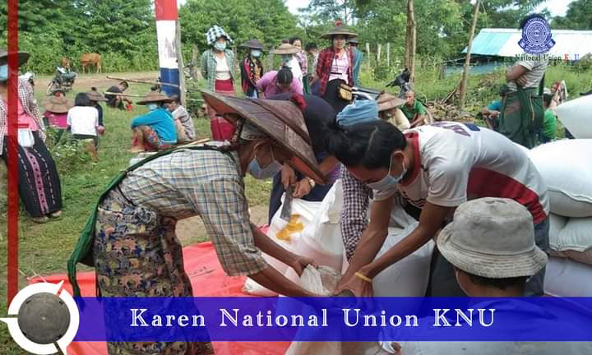An interview with Saw Khe Lay, deputy head of CIDKP
After the military coup, international donors and organizations providing humanitarian assistance to internally displaced people (IDPs) and local communities in Myanmar have to pass through the military council’s administration. Because of this situation, donors say they are unable to provide effective assistance to areas where it is needed.
In this interview with KIC, Saw Khe Lay, deputy head of the Committee for Internally Displaced Karen People (CIDKP), spoke about the challenges of providing international support and cross-border assistance to the large number of internally displaced people in Karen State (Kawthoolei region).
Q – Currently, there are international organizations providing humanitarian aid to Myanmar. Is this aid sufficient for the internally displaced people in Karen State? What else is needed?
A – It’s certain that we haven’t received as much aid as the international community has said. They have talked about providing aids to Myanmar, but it’s certain that not enough aids have reached those in need in our Karen areas.
However, some aids may have been delivered to other regions such as Sagaing, Arakan, and northern Myanmar. Behind the scenes, they may have had to circumvent the military’s procedures. I think cross-border aid to Karen State would be very difficult for large organizations.
Even if the aid comes from inside Myanmar, the military council won’t allow it in certain situations. So we aren’t getting the aid that we deserve. A lot of negotiations are needed for this. And Since we must also respect the rules and laws of a country, we must weigh carefully when providing cross-border assistance. So, it becomes difficult to provide adequate assistance.
Q – How much assistance can CIDKP currently provide to IDPs in KNU areas?
A – According to various estimates, there are about 600,000 internally displaced persons in KNU-administered areas. This number includes those who have been displaced for a long period of time, those who have been displaced for a short period of time, and those who have had to flee during armed clashes under various circumstances. We can only support a little more than half of them. Not even half, to be exact. We can only support what they need. So the percentage of IDPs that we can support right now is still quite small.
Q – What are the challenges in securing cross-border aid?
A – If we want to provide cross-border aid, there are regulations on the Thai, Chinese and Indian sides that need to be followed. Let’s say we want to support 30,000 IDPs, we have to take big risks. Behind the scenes, donors also have to respect the laws of each country. So it’s difficult to get that kind of aid.
Q – What kind of support does CIDKP need right now?
A – If we have enough resources, I think we can do much more than we do now. We have about 100-200 staff. If we have more staff, we can create more. Our staff are stationed in the respective towns and districts. They assess the situation and report back the needs. Our rescue operations include activities such as transportation and distribution. Most importantly, we need funding and other support. If we get these, we can provide much more help.
Sent by KIC.

